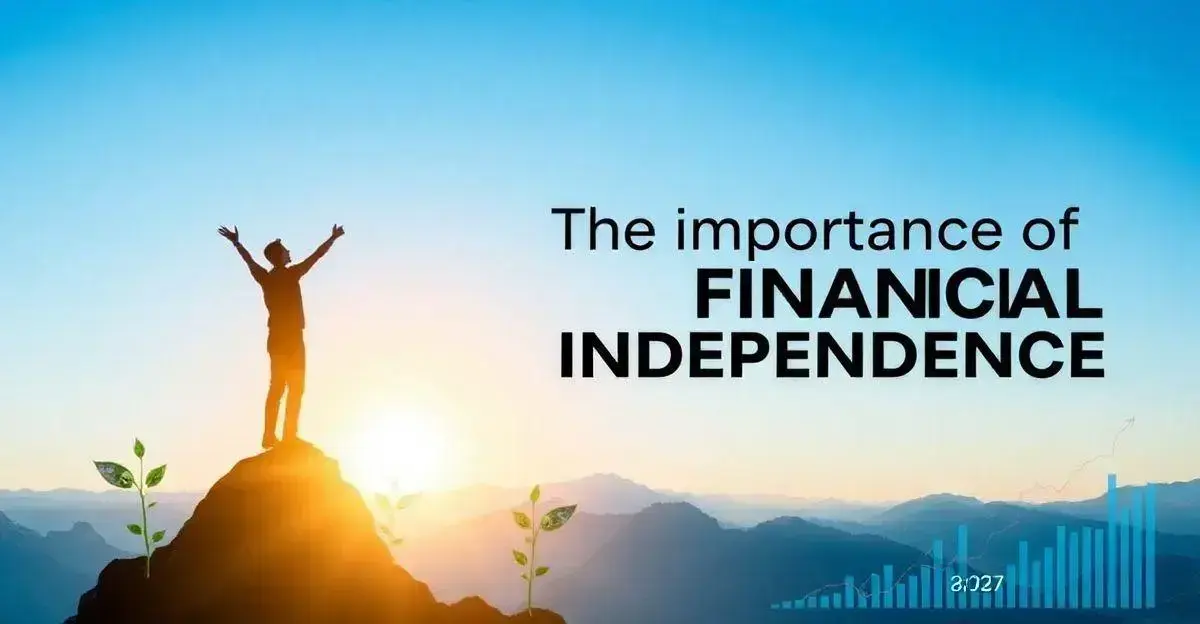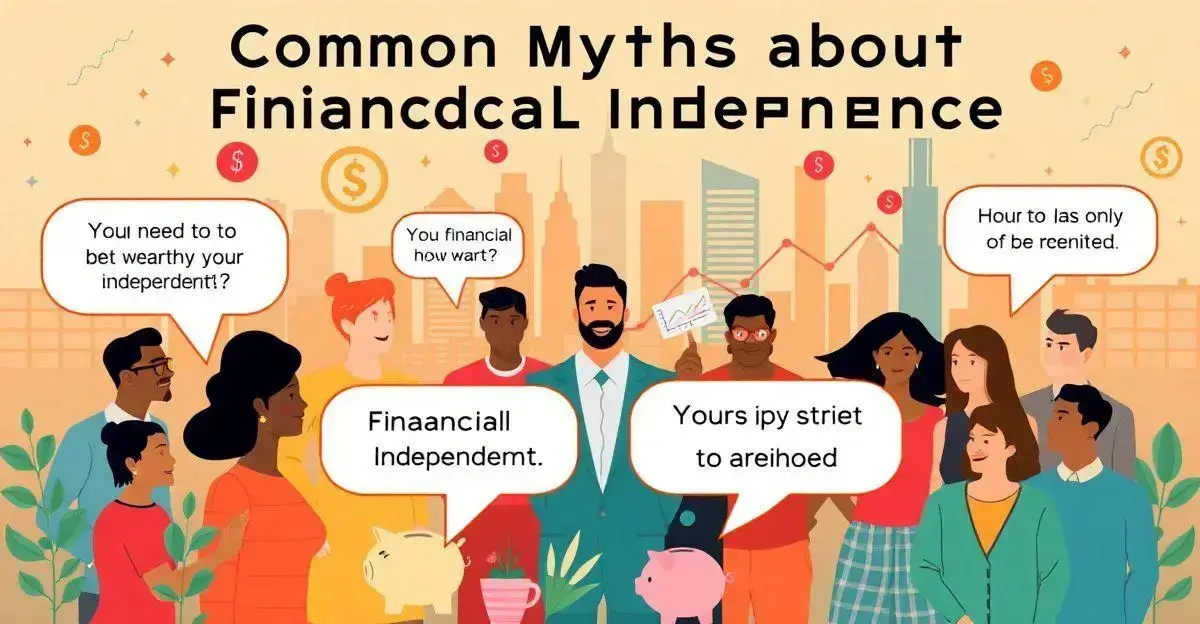Índice
Financial independence is a life-changing goal that many strive to achieve. Whether you seek to retire early, travel more, or simply live without financial stress, understanding the concept of financial independence is crucial.
What is Financial Independence?
Financial independence is the status of having sufficient personal wealth to live, without having to actively work for basic necessities. This means that your investments, savings, or other assets provide you with adequate income to cover your living expenses.
Achieving financial independence is often seen as the ultimate financial goal, enabling individuals to enjoy their lives without the pressures of day-to-day financial burdens.
Methods to achieve financial independence include savings, investing, and smart budgeting.
It empowers you to pursue your passions, whether it’s travelling, starting a business, or spending more time with family.
Financial independence is not just about accumulating wealth; it’s about achieving a lifestyle that aligns with your values and passions.
The Importance of Financial Independence

The importance of financial independence cannot be overstated. It creates a sense of security and freedom in your life.
When you are financially independent, you are not tied to any job or source of income. This allows you to make choices that align with your passions and values.
Additionally, financial independence reduces stress and anxiety, as you no longer have to worry about meeting basic needs or living paycheck to paycheck.
Many people aspire to achieve this status as it opens up opportunities for travel, education, and personal growth.
In essence, financial independence gives you control over your life and the ability to pursue what truly matters to you.
Steps to Achieve Financial Independence
Achieving financial independence involves several key steps that can set you on the right path. First, create a strong budget to track your income and expenses. This will help you identify areas where you can save money and explore ways to make extra income, such as through Money Online opportunities.
Next, focus on building an emergency fund, which is crucial for unforeseen expenses and financial security. Once you have that, start investing your savings wisely. This could mean putting money into stocks, bonds, real estate, or Money Online investments, allowing your money to grow over time.
Additionally, consider paying off high-interest debt to free up more of your income for savings and investments. Regularly review your financial goals and adjust your plan accordingly to stay on track.
Lastly, educate yourself about financial literacy, as understanding how money works will empower you to make better financial decisions in the long run.
Common Myths about Financial Independence

There are many myths about financial independence that can mislead individuals on their journey. One common myth is that you need to be wealthy to achieve financial independence. In reality, it is more about budgeting and saving than having a high income.
Another myth is that financial independence means you will never work again. Many individuals choose to work on passion projects or part-time jobs, even after achieving financial independence.
Additionally, some believe that once you reach financial independence, you can stop learning about finance. Continuous education is key to maintaining your wealth and adapting to new economic conditions.
Finally, some people think that financial independence is only for young people. In truth, anyone at any age can achieve this goal with the right planning and dedication.
Understanding these myths is crucial for creating a realistic path to your own financial independence.
Financial Independence vs. Financial Freedom
Financial independence and financial freedom are often confused, but they represent different concepts.
Financial independence is achieved when your investments generate enough income to cover your expenses. This allows you to live without relying on a traditional job.
On the other hand, financial freedom is about having the ability to make choices, such as how to spend your time and where to live, without worrying about financial constraints.
It is possible to be financially independent but still feel financially constrained if your income is tied to specific investments.
Many people work towards both, as they can enhance your overall quality of life.
Ultimately, understanding the difference between the two can help you set better personal financial goals and achieve the lifestyle you desire.
Tools and Resources for Financial Independence

Achieving financial independence requires the right tools and resources.
One important tool is a budgeting app, which helps track your income and expenses effectively.
These apps allow you to set financial goals and monitor your progress.
Additionally, there are various investment platforms available that enable you to invest your savings in stocks, bonds, or mutual funds.
These platforms often provide educational resources to enhance your financial knowledge.
Another useful resource is online courses on personal finance.
These courses can teach you about budgeting, investing, and savings strategies.
Furthermore, joining a financial independence community—whether online or in person—can provide support and accountability.
Engaging with others who share similar goals can make the journey to financial independence easier and more achievable.
Real-Life Success Stories of Financial Independence
Many individuals have successfully achieved financial independence, demonstrating that it is attainable with the right strategies.
One inspiring success story is that of a couple who started saving aggressively in their 20s. They lived below their means, invested in low-cost index funds, and focused on building a diverse portfolio. By their mid-30s, they reached financial independence, allowing them to travel the world and pursue their hobbies without the burden of a full-time job.
Another example involves a single mother who leveraged her skills to create a side business. Through hard work and dedication, she gradually grew her income, invested her profits, and paid off her debts. By the time her children were in high school, she had become financially independent, enjoying more time with her family.
These stories show that with determination and smart financial planning, anyone can achieve their financial goals.
Frequently Asked Questions about Financial Independence
What is financial independence?
Financial independence is the state of having enough income to support your lifestyle without relying on employment.
How can I achieve financial independence?
You can achieve financial independence by budgeting, saving aggressively, and investing wisely.
Is financial independence only for the wealthy?
No, financial independence is attainable for anyone with the right strategies and discipline, regardless of wealth.
What is the difference between financial independence and financial freedom?
Financial independence means having enough income from investments, while financial freedom refers to the ability to make choices without financial constraints.
What tools can help me on my journey to financial independence?
Budgeting apps, investment platforms, and personal finance courses are valuable tools for achieving financial independence.
Are there success stories of people achieving financial independence?
Yes, many individuals have shared their journeys and strategies for achieving financial independence, inspiring others to pursue similar goals.
